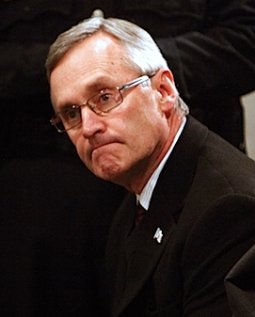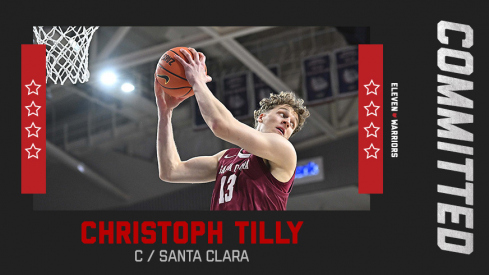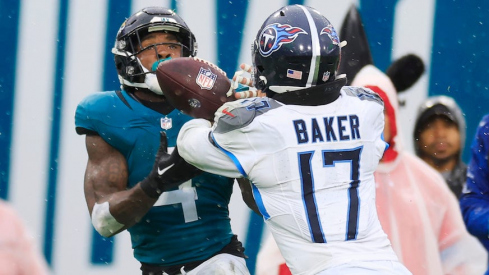 Meeting with the NCAA clearly wasn't JT's finest hour
Meeting with the NCAA clearly wasn't JT's finest hourI know we’re all still totally perpendicular in the mid-section (the men at least) following the NCAA’s statement that Ohio State will not face any new allegations nor a failure to monitor charge in the wake of “Gate’s” Tat and Tressel - and we have every right to be - but there’s still part of me completely dumbfounded by the whole episode.
The taste of knowing no school has ever been hit with a post-season ban without first being tagged with failure to monitor is as sweet as Tupelo Honey but after reading the transcript of Tressel’s February 8th interview with the NCAA, I’m still miffed at how our beloved coach could be so cavalier in his handling of the situation and how poorly he came off when responding to certain questions posed by investigators.
To be clear, all things considered, I’m still incredibly thankful for the Tressel Era of Ohio State football.
It brought the first national title of my lifetime and saw the Buckeyes rise to a level of national prominence that I fully consider worth the fallout. Right or wrong, that’s just the way I feel. That said, I’m not in the camp thinking Tressel committed a righteous act by falling on the sword to save the school increased punishment. If anything, he clearly risked increased punishment and was very well aware of it.
Reconciling his actions against the senatorial public persona we saw in pressers and on gameday is pretty difficult and from reading the interview transcript, it's evident he was far from the confident and comfortable coach we’ve come to know.
We joke about the “and so forth” count and whatnot but even when he was in a post game presser speaking a bunch of words without really saying anything, he was still in control of the situation. Reading the interview, it’s easy to picture him as the complete opposite.
As an example, here’s coach upon being asked to give an instance of when he took a situation to Gene Smith or compliance:
...and I guess the other one would be when we get those calls and messages left, you know, at the secretary’s desk of, “I saw your student athlete at such and such with so and so,” you know, we’ll always called, you know, and say, “Hey, Doug,” you know, either, “I’ve never heard this name but there seems to be some alarm,” or, “I’ve heard this name, and it might be time to disassociate.” We use that phrase a lot. When does that moment come where you, “Hey, I’ve heard that name, you know...“– too frequently.” And then usually that’s probably the last I have to do with it because they end up taking it and calling people in and talking to ’em about people and calling student athletes in and so forth. You know, very few times – you know, I guess another example I’d use is so and so calls in and says, “Hey, I’ve seen Johnny driving this certain kinda car.” And so we’ll call and say, “Hey, what’s the updated vehicle registration form,” because it’s – you know, that’s one of the things we chase. And, you know, so Doug and his office are forever on the phone, you know, trying to – you know, so anytime, you know, something from that standpoint comes up, you know, we, you know, we try to help the cause.
It’s easy to feel for any coach at a football powerhouse with regard to all the noise that comes their way via a “concerned public” that bombards the office with potential allegations of wrongdoing, so much so that taking them all serious is next to impossible. Here’s Tressel adding a little color to such goings on:
They love to call the names of the guys they know, you know? Certain guys are everywhere. Well, they couldn’t a been in the same place – you know, six different places at the same time, you know? So I can’t tell you that every time every little thing is brought up. But I remember one about two-three springs ago, we got a call from a little gal that worked at a golf course hot dog stop at the ninth hole. And she called and was all distraught, Doug, remember, that someone bought one of our guys a hot dog, you know? And, you know, that seems a little frivolous, if you will, but still it was, you know, a young person using a name. I said to Doug, you know, “Hey, this happened at this golf course. And, you know, we should probably check it out,” you know? Which, if I recall, we did and his roommate or whatever, you know, was the guy that bought it, you know, so forth and so on? But so I guess that, you know, have to feel it a little bit because people love to, you know, be in the know.
Moving on to the line of questioning regarding his reaction to Cicero’s initial email that players might be involved with a shady character caught up in a federal investigation, Tressel was clearly shaken:
But probably the thing that knocked me off my socks was at the bottom when there was a little description of this criminal. And, again, I didn’t emblazon in my mind his name. I just emblazoned in my mind, “Oh, my God. There’s a homicide. There’s drug trafficking. There’s possession of criminal tools. This is a bad situation. This is, you know, this isn’t like the girl that called from the hot dog stand. This is not like the guy that calls from the bar and says they might be getting a drink. This is frightening.”
Obviously confused as to what he should do next, Tressel talked of his inner struggle and of what he would do if given a do-over:
And so those next couple weeks, in my mind, I spent a lotta time, you know, pounding, pounding, pounding, and also wondering, “Where do I – you know, where do I look for some help with this?” ’Cause to me, it wasn’t simply an NCAA rule. And I’m not belittling the importance of an NCAA rule. But it was way beyond an NCAA rule. I mean, it was a security issue. It was a federal criminal issue. It was a narcotics issue. You know, it – you know, where do you turn? Knowing what I knew – not knowing who all was involved with it – I mean, I knew one name. So you sit there saying, “Oh, my God. Do I got 25 guys drug trafficking? Do I got, you know, X number of people selling their stuff so they can feed their drug habits?” You know? I mean, you go through a million things. If I fastforwarded to today, I think I have the answer to what I would do. I would go to the university legal counsel because it’s a federal issue. I wouldn’t go to the athletic department legal counsel. I wouldn’t go to the compliance office. I wouldn’t go to – I would go right to the level of, you know, the extreme part of the situation and ask for some help. I say that because since this has all been started to get discussed, I’ve asked that question, and that’s kind of the response – not kinda. That has been the reflective thought of after the fact, you know? Not during the fact, you know, but after the fact. You know, knowing – you know, after the fact, we know that there wasn’t criminal activity and that there wasn’t drug trafficking and all that. But I didn’t know that, you know, at the time I was, you know, deciding...
With that, the questions turned to his decision to not escalate the issue to university officials, instead choosing to inform Sarniak. Why did Tressel, scared and frightened, turn to Sarniak instead of administrators?
My response would be my biggest fright was the one guy named, you know, from my responsibility in that e-mail. I have a strong working relationship with the XXXX figure. I have a high awareness of the vulnerability of the young person, and that I felt from a safety standpoint that I needed to alert Ted to the gravity of that, that I would have a hard time – you know, I don’t wanna be dramatic, but I would have a hard time having a second guy murdered or a second guy get incarcerated. That’s – I don’t wanna, you know, over-dramatize, but that’s why I felt like that was, you know, what I needed to do.
This is the part where you can start flaming Pryor since JT’s desire to protect his QB is what drove the decision to try and handle things sans the university.
A little later, proving he’s still in coach-mode, Tressel says the following in response to being asked if he wants to take a five minute break:
I don’t know. We’re rolling. Are you guys hurting?...Well, I’ve got – I mean, I hope, and you do to, too – I hope you have a lock into what’s going on...I don’t wanna go and half a halftime, and come out and play a bad second half.
Agreed. The last thing we needed here was a 2nd half reminiscent of the Sugar Bowl.
Focusing back on Cicero’s emails and why Tressel didn’t take those to someone at the school, coach implied he was caught up in the fact the emails were supposed to be confidential and that if Cicero had instructed him to escalate, he would’ve:
I guess that was my only reach for help, maybe. I guess, you know, as I think about it because, you know, if he would have said to me, “Hey, here’s what you need to do.” “Go to your legal counsel at the university level, ’cause this is, you know, federal,” or if he’d a said, “Hey, you need to go to Gene,” or, “You need to go to your compliance office,” you know, that would have I guess made my life easier. And that wasn’t necessarily the response I got, you know, as you, you know, turn forward. But, yeah, that was probably the one spot I reached out.
I suppose that’s possible but I’m having a hard time thinking he would’ve done as instructed by Cicero, if only because he willingly sent the info to Sarniak without any instruction from Cicero.
In the between time, Tressel says he met with the players individually but only in a vague fashion and for incredibly short timeframes (“two minutes max” ?), often not even in a “sit down” type setting. And when they did meet, he never brought up Rife’s name or the tattoos, he just generically advised the player to stay away from the wrong people and places. If for not trying to keep things under wraps, why else would Tressel be so vague when trying to get kids to keep themselves and the program out of danger? Was this a strategy to protect the university? I just can't bring myself to that conclusion, as much as I want to.
Further, though at least one player interview from the case summary suggests Tressel stated specifically that he “didn’t want to know” what the players were doing, Tressel indicated he would’ve instead used a phrase like, “I don’t know” what you guys are doing when trying to scare them straight. Now, he did at least advise the players to be honest if/when questioned more specifically by law enforcement, university or NCAA officials.
Later, when asked whether or not he was aware the Tat5 would likely be ineligible to participate in 2010 football, Tressel offered up a response that is a little hard to believe:
No, I didn’t think of it like that. You know, I didn’t take that progression of thinking. I mean, I knew that inevitably they were gonna have a problem. I don’t – you know, I can’t sit here and say I thought, “Oh, these guys are ineligible.” I didn’t think it of it that way.
Pressing further, Chuck Smrt specifically noted emails that indicate potential eligibility issues for a couple players with the season fast approaching and inquired if Tressel, at that point, considered whether or not he’d be fielding ineligible players. Tressel’s reply:
I was thinking that when the situation is resolved, that they will certainly have penalties. And whoever else because, you know, the inference is in there where there were multiple, you know, X number of jerseys and, you know, stuff. So that, you know, whether it be those two or those two and anyone who was involved, you know, there’s gonna be – you know, as I pointed out when I got off of my rambling thing there, is that, you know, we had to prepare for the inevitable, and there was gonna be an inevitable.
Another stunner for me comes when Tressel is asked why, after the players were reinstated for the Sugar Bowl, why he didn’t then bring up the emails from Cicero. Tressel stated it was because he promised Cicero confidentiality. He also stated he couldn’t even remember Cicero’s name at that point and basically had to scroll through his cell phone on December 23rd as Ellen was driving them to Cleveland, at which point he stumbled across Cicero’s name his phone’s directory.
Now, I’m sure Tress has conversations with thousands of people but I don’t know how to reconcile that he could possibly forget the name of a former player, now attorney, that sent him mind blowing emails about four of his most valuable and high profile players being involved with a drug trafficker under federal investigation.
Bottom line, Ohio State received some great news from the NCAA yesterday. The bad news however is that the Woody of my lifetime doesn’t appear to have fared as well.
Prior to this transcript, I felt Jim Tressel had coached his last game but only because that would be his choice. After reading his responses to some of the questions outlined above, I’m more of the opinion that such a decision will no longer be his to make. And for that, my heart feels a little like Charlie Bauman’s throat did on that December night in Jacksonville. Dazed and confused.

